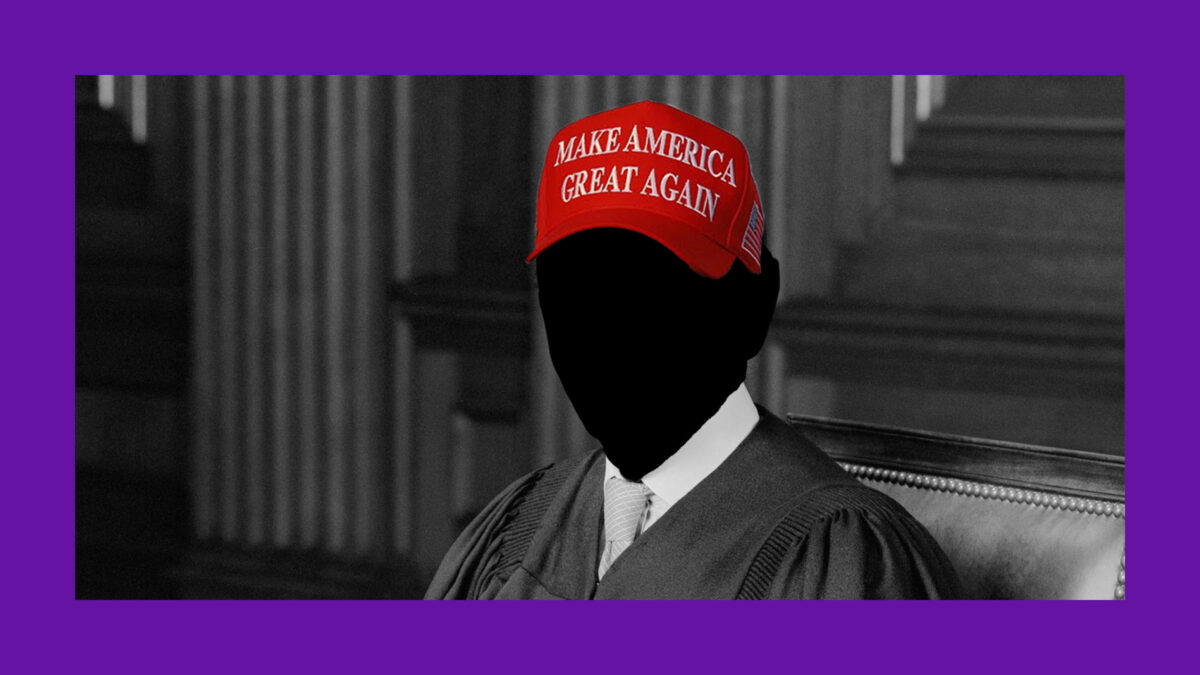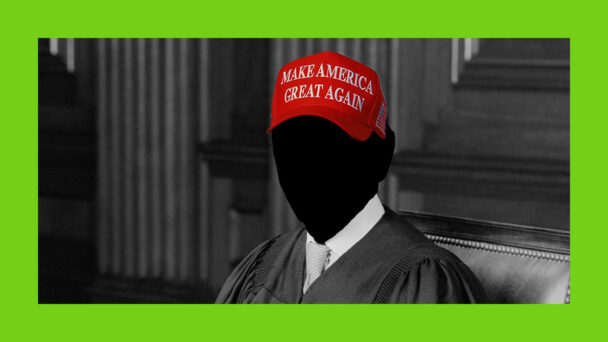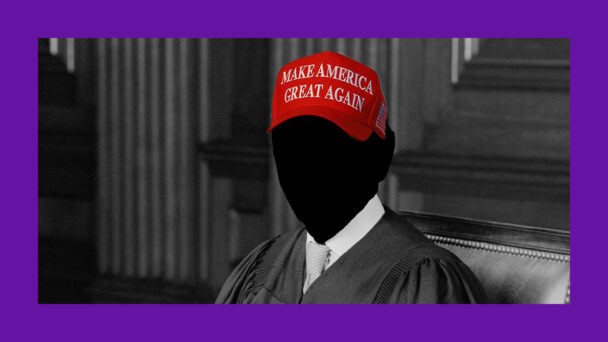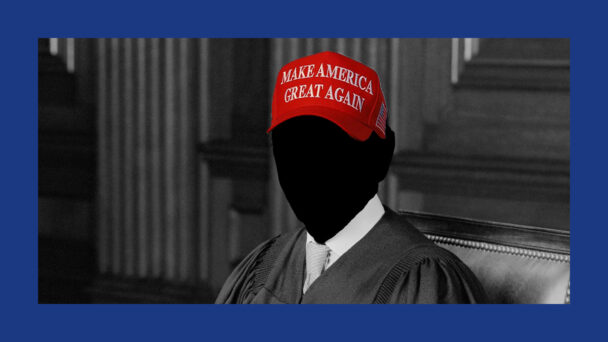Welcome to the FedSoc Twelve, a Balls & Strikes series about some of Donald Trump’s most unhinged judicial appointees. These judges, whether in their legal opinions or their off-the-clock conduct, have continued to push Trump’s agenda from the bench, forming something of a life-tenured Originalism Caucus within the federal judiciary. This summer, we’ll be checking in on these men and women now that they’ve gotten a chance to spread their wings during the Biden administration—and as they fight to be first in line for a Supreme promotion the next time Republicans control the White House.
The Bio:
Kyle Duncan’s career almost never got off the ground. After graduating from Louisiana State University’s law school, he clerked for John Duhé, a Reagan appointee on the Fifth Circuit. But a few starter jobs didn’t stick, so he went back to school, earning a master’s degree from Columbia and flirting with a career in academia.
After that, though, he scored increasingly high-profile jobs. First, he oversaw appeals at the Louisiana Attorney General’s Office from 2008 to 2012, including representing Louisiana at the Supreme Court in Connick v. Thompson. In that case, Louisiana prosecutors committed a string of constitutional violations that caused a man to be wrongfully sentenced to death. When Duncan argued the case, he argued that prosecutors are trained in the law in law school, so they could never violate the Constitution. The Supreme Court didn’t go that far, but they did hold 5-4 that the prosecutors were immune, overturning a $14 million jury verdict.
After that, Duncan was the general counsel of the Becket Fund for Religious Liberty (now Becket Law), a well-monied legal nonprofit that primarily represents America’s whiniest Christian small business owners claiming that regulating their business violates their religious freedom. While at Becket, he was back in front of the Supreme Court, this time representing Hobby Lobby in the Burwell case. There, the Court held 5-4 that business owners weren’t required to pay for health insurance for their employees that covered certain kinds of contraception if they really didn’t want to.
With multiple Supreme Court arguments under his belt, Duncan left the Becket Fund and started his own boutique law firm, continuing to represent America’s most right-wing freaks in federal courts across the country. He got in on the ground floor of the current transphobia panic. When North Carolina passed the first “bathroom ban” all the way back in 2016, he represented the Speaker of the North Carolina House when the speaker sought to intervene to defend the law. (North Carolina later repealed it.) He represented a Virginia school board that sought to prevent Gavin Grimm, a trans man, from using the men’s bathroom. (Duncan lost.) And in a family law case, he argued that Georgia courts could not legally allow non-birthing parents in same-sex relationships to adopt their children. (He lost again, this time 9-0.)
Duncan had gone from winning case after case working for the state and right-wing legal groups to losing case after case after hanging his shingle. But he’d proven his right-wing credentials. In 2018, Trump appointed him to serve on the ultraconservative Fifth Circuit Court of Appeals and the Senate confirmed him 50-47. And it’s much harder to lose cases when you’re the judge.
The Opinions
On the Fifth Circuit, Duncan has had plenty of opportunities to advance the goals of the right-wing legal movement, often leaping ahead of the Supreme Court. During the pandemic, he helped Texas undermine Roe v. Wade in the years before the Supreme Court finally overturned it. In March of 2020, when COVID-19 began spreading in earnest in the United States, the state of Texas “temporarily” banned abortion. Claiming that all scarce medical resources were needed to fight the pandemic, Texas Governor Greg Abbott issued an executive order declaring all abortions “non-essential” and postponed. A federal district court enjoined the order a week later, but Duncan and another Fifth Circuit judge stepped in to let the ban take effect.
To be fair to Duncan, it was early days in the COVID-19 pandemic, and maybe he thought that all hands on deck were needed to fight the virus. Or maybe he was just being a disingenuous accomplice for the governor’s unconstitutional move. Governor Abbott’s order was to “postpone all surgeries and procedures that are not immediately medically necessary … to preserve the life of a patient.” And because abortion is a medical procedure with a time limit – before the Supreme Court overturned Roe, Texas prohibited abortion after 20 weeks – that was an abortion ban, at least for some women. But to Duncan, it wasn’t! It was just a “delay” for “certain non-essential abortions.” So the district court must have had it wrong, and the Fifth Circuit had to step in.
But it’s not just abortion. Duncan is a good soldier on any culture war issue. Last year, he helped Students for Fair Admissions undermine affirmative action in Texas a year before the Supreme Court banned it nationwide. The University of Texas had a limited affirmative action program that the Supreme Court had upheld in 2016, in Fisher v. UT. That “Fisher” was Abigail Fisher, who formed Students for Fair Admissions with her attorney a few years before she lost her case. Undaunted, she sued again in 2020, this time using her nonprofit group. A district court dismissed her claim, finding that she had lost already and that the same person couldn’t sue the university twice for the same reason.
But Duncan disagreed, sending it back to the district court. He held that because Fisher and her attorney had voted as directors of their nonprofit group to file suit, they weren’t the “same person.” Besides, he held, Students for Fair Admission had five directors, and Abigail and her lawyer were only two of them, so it wouldn’t be fair to the rest of the group to toss the suit. The university pointed out that one of the other three directors was Fisher’s dad, and the district court had found that the three of them controlled the group, but Duncan disagreed. “Nothing in the record,” he sniffed, supported finding that Fisher and her dad were acting in concert. So, just like the Supreme Court, he’s willing to overlook bald-faced lies about the facts of a case if it gets him where he wants to go.
He’s even willing to take on extra work to prove his reactionary bona fides. In 2020, a federal inmate had come out as a transgender woman while behind bars. She asked a federal court to amend the judgment against her to reflect her new name. The district court denied her motion, finding that it didn’t have jurisdiction to change the judgment and questioning how she had her name changed while she was in prison.
That was bad enough, but it was when the inmate appealed to the Fifth Circuit that things really went off the rails. The inmate asked both to have her judgment changed and for the court to address her with female pronouns. Duncan could have summarily affirmed the district court opinion in a brief opinion. Instead, he decided to write a 10-page opinion, exhaustively explaining that “[n]o authority supports … requir[ing] litigants, judges, court personnel, or anyone else to refer to” trans people by their name and pronouns. Duncan threw out a litany of weird justifications, but it became clear that he was trolling when he started quoting LGBT-affirming resources as evidence of just how ridiculous it would be to call a prisoner Kathrine because she asked him to. Duncan ended by haughtily declaring that he “decline[d] to enlist the federal judiciary in this quixotic undertaking.” The quixotic undertaking of calling a woman Kathrine!
The Weird Stuff
Duncan made headlines earlier this year when he spoke at Stanford Law School. Or, more precisely, when he wasn’t allowed to speak. The Federalist Society chapter of the law school invited Duncan to a discussion titled “Guns, Covid, and Twitter,” which presumably induced multiple deaths by groaning in the Bay Area. Stanford Law students (correctly) identified Duncan as a right-wing ideologue, and they shut down the talk by showing up en masse with signs, costumes, and chants. Inviting Duncan to speak seems like it was intended to rile up left-leaning law students and show how persecuted conservatives are on law school campuses. As far as that goes, the Federalist Society got their wish, with multiple legal news outlets reporting sympathetically on their plight. The Stanford Law administration even apologized.
But all the media hubbub and the school’s apology had to ignore how Duncan messed up his role in the whole thing. After being warned that subversive elements might try to disrupt his talks, he showed up to campus with his phone camera out, recording students who might try to heckle him. And instead of quietly sitting there as a martyr to the conservative legal movement, Duncan tried to pick a fight with a hundred law students. It didn’t go very well. From the beginning of his remarks, he let slip that the protest was really bothering him – “I’m not blind,” he said, “I can see this outpouring of contempt.” Energized, the protesters kept going. In the middle of his speech, he snapped: “In this school, the inmates have gotten control of the asylum.” When calling the protesters insane didn’t work, he tried a sneering appeal to their sense of hospitality: “Do you think this is an appropriate way to treat a guest?” Somehow, that didn’t quiet them, either.
After Duncan was unable to subdue a large group of justifiably angry people with the power of his wits, he demanded that the school administration silence the crowd. Fortunately for him, there was a law school dean at the talk. Unfortunately for him, the dean was the associate dean for diversity, equity, and inclusion, who reminded Duncan that while the students were merely shouting at him, he was a sitting federal judge: “You have authority, and you have power to make decisions that impact the lives of millions.” This didn’t mollify Duncan one bit. While she was speaking, he exclaimed “This invitation was a set-up!” as if he forgot that the Federalist Society, not Stanford Law’s dean for DEI, invited him to speak. (In a post-script that should be embarrassing for Stanford, that dean had to resign last week.)
Sadly, the whole thing became a referendum, not on whether right-wing judges have any self-control, but on so-called “cancel culture.” Other right-wing judges jumped on the story, boasting that they would “boycott” Stanford Law by refusing to hire their students, even though they were only going to hire Stanford’s Federalist Society students anyway. Duncan was able to prove that being a federal judge wouldn’t stop him from serving in the front lines of the culture war. If the movement needed him to fly to Palo Alto to scream and cry and throw up on stage, he would answer the call. And if Trump can put him on the Supreme Court, that next flight could be even nicer.




